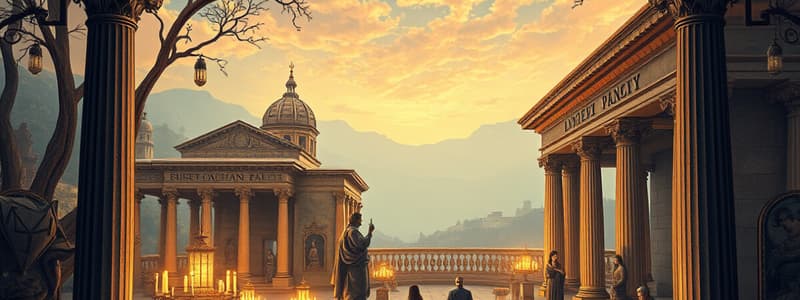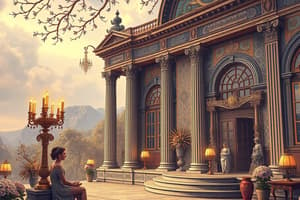Podcast
Questions and Answers
What is an orator?
What is an orator?
- A gifted speaker (correct)
- A style of architecture
- A type of weapon
- An ancient Roman coin
What is a foundation myth?
What is a foundation myth?
society's folk tale about how it originated
What was the Pax Romana?
What was the Pax Romana?
the long period of peace experienced under the rule of the Roman Empire
What is a peninsula?
What is a peninsula?
What is a republic?
What is a republic?
Who are Romulus and Remus?
Who are Romulus and Remus?
What does 'The Roman Empire' refer to?
What does 'The Roman Empire' refer to?
What geographical advantages did Rome have?
What geographical advantages did Rome have?
Ancient Romans believed their city had been founded by:
Ancient Romans believed their city had been founded by:
The story of the city's origins was based on:
The story of the city's origins was based on:
Rome's geographic advantages included its location on the:
Rome's geographic advantages included its location on the:
What role did geography play in Rome's trade?
What role did geography play in Rome's trade?
When did Rome become a republic?
When did Rome become a republic?
Match the following social classes of Rome with their descriptions:
Match the following social classes of Rome with their descriptions:
What were the Twelve Tables?
What were the Twelve Tables?
What characterized the patrician class?
What characterized the patrician class?
What characterized the plebeian class?
What characterized the plebeian class?
Describe the three branches of the Roman government.
Describe the three branches of the Roman government.
Which feature of the Roman government is also found in the US government?
Which feature of the Roman government is also found in the US government?
Flashcards are hidden until you start studying
Study Notes
Key Concepts of the Republic of Rome
- Orator: A skilled and eloquent speaker, significant in Roman politics and public life.
- Foundation Myth: A cultural narrative explaining the origins of Rome, specifically the tale of Romulus and Remus.
- Pax Romana: An extended period of peace and stability across the Roman Empire, facilitating trade and cultural exchange.
Geography and its Impact
- Peninsula: Rome is situated on a landmass surrounded by water on three sides, enhancing trade opportunities and defense.
- Geographical Advantages:
- Located on the Tiber River, providing access to the sea.
- Surrounded by hills and mountains, offering natural protection against invasions.
- Fertile land supporting agriculture, crucial for sustaining the city's population.
Foundation of the Roman Republic
- Rome established its republic in 509 BCE, marking a shift to a government run by elected representatives.
- The concept of a republic was inspired by earlier Greek civilizations.
Social Structure
- Patricians:
- Wealthy, noble class, holding significant political power.
- Controlled the Senate and had privileges in political representation.
- Plebeians:
- Common citizens including merchants, farmers, and laborers.
- Elected representatives called tribunes to voice their concerns and protect their rights.
- Advocated for the creation of laws, leading to the Twelve Tables.
Legal Framework
- The Twelve Tables: Rome's first set of written laws, which were publicly displayed on bronze tablets to educate citizens about their rights and responsibilities.
Roman Governance
- Three-Branch Government Structure:
- Executive Branch: Led by two consuls, primarily patricians with military command.
- Legislative Branch: Comprised of a Senate (patricians) and assemblies (plebeians) with various powers, including lifetime service for some.
- Judicial Branch: Consisted of eight praetors, serving one-year terms to oversee legal matters.
Expansion and Influence
- Starting around 300 BCE, Rome began territorial expansion, which played a crucial role in enhancing its influence and reach within the Mediterranean region.
- Cultural exchange: Proximity to Greece influenced Roman culture, arts, and philosophy.
Comparison of Government
- Similarities with the U.S. Government:
- Both feature a separation of powers among different branches, ensuring checks and balances in governance.
- Only certain branches have limitations based on class, highlighting societal structures in both systems.
Studying That Suits You
Use AI to generate personalized quizzes and flashcards to suit your learning preferences.




